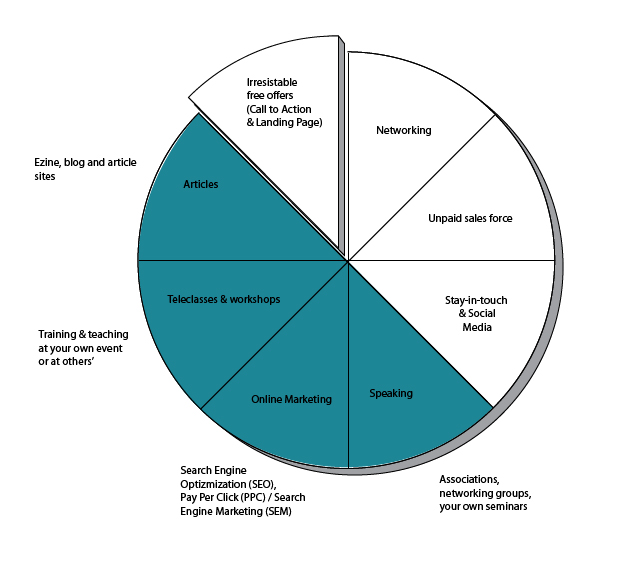This is the second part of a two-part series on The Marketing Pie, which looks at all the different elements of marketing and breaks them down into sections that can be approached a few at a time. Read part one of Looking At The Marketing Pie.
Speaking
Speaking is one of the best ways to reach a large group of ideal prospects at one. Unlike a webinar, email or personalized video, you are live and in front of your prospects and are able to direct all of your personal energy and effort at them.
In order to maximize your speaking engagement, you need to seek out your target market and discover when they hang out in crowds.
- Is there an industry or association conference or seminar they are at? Try to arrange a speaking gig on a topic that will be of interest to them.
- Are your power partners running an event for your ideal target market? Find a way to connect and team up with them.
- Is there a strong need for your topic or service? Start running your own teaching events, no matter how small they start out.
Speak at networking groups, toastmasters, Chamber of Commerce events, associations, industry conventions and seminars. You want to be seen everywhere so that in the end your ideal clients come to you because you are everywhere they turn.
One thing to remember, you must provide valuable content and minimize your sales pitch, but make sure you do have a compelling or irresistible offer to galvanize them at the end of your speech.
Online Marketing
One of my favorite methods of marketing is online marketing – making your website work for you. Nothing is better than getting a lead through your website because you built it correctly months ago.
Online marketing involves getting traffic to your website, turning that traffic into leads, nurturing those leads and then turning those leads into customers. It doesn’t stop there; once you have customers, ask for reviews from them to help you get more customers (all online). Some of these items run into other areas of marketing and that is the beauty of it, everything ties in together.
One of the first things you need to do is get traffic to your website. This happens through organic (on-page) SEO and paid or off-page SEO. Organic SEO involves optimizing the content and keywords on your page for the items your ideal clients are searching for in order to show up in the first page of Google search results. This includes items such as Title and META tags.
Content is king and this means not only having the correct, relevant content, but also fresh, new and constantly changing content. New content can come in the form of a blog on your website where you create entries based on the information your customers are searching for or new pages and images as well.
Off-page SEO includes link building, which is leveraging other websites to show that your website is of value and interest to others. When other pages link to your website correctly and are about similar topics, it tells Google that your page is of interest and relevant to others as well and helps you rank higher.
Search Engine Marketing includes items such as Pay Per Click ads where space can be bought at the top of Google searches, on other websites, and valuable real estate space such as the side of Facebook. Organic SEO can take a while to build up and produce results while paid search results kick into place instantly.
Once users are on your site, you then need to convert the traffic into leads. Read more about Irresistible Offers.
Examples of Online Marketing
- Search Engine Optimization (SEO)
- Blogging
- Local Search
- Online reviews
- Pay Per Click (PPC)
- Search Engine Marketing (SEM)
Teleclasses & Workshops
Teleclasses and workshops are similar to speaking in that you reach a larger audience at once, but they go into greater detail. At these events, you offer training and an introductory taste to your services so that your ideal clients can gain a better understanding of your value and want to learn more from you or want to receive more help.
Articles
Articles are about creating fresh and new content, both on and off your website. On-site content includes blogs while off-site content can be e-zines or articles that you write and then link to your own website (link building).
By answering commonly asked questions or providing valuable information, you are also building up your reputation as an expert in your field. These articles can appear on websites that are more frequently scanned by Google and receive more traffic than yours and allow you to gain access to new potential clients.
Do you have an example of how you have been able to tie together several of these elements? Leave a comment and let me know!
